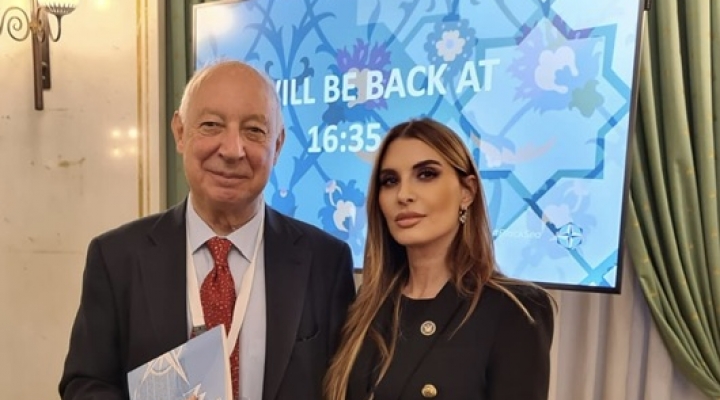At the High-Level Conference BALKAN AND BLACK SEA PERSPECTIVES 2022: “Supporting the Transition”organised by NATO Defense College Foundation in co-operation with the NATO Public Diplomacy Division, the Ministry of Foreign Affairs and International Cooperation and the NATO Defense College on the 7th of December 2022 in Rome, was present the Dr. Cristina Di Silvio in qualità di Legal Advisor of the INTERNATIONAL INSTITUTE for DIPLOMATIC RELATIONS COMMISSION FOR HUMAN RIGHTS, of the United Nations e Director of International Relations for the European Community, UNITED STATES FOREIGN TRADE INSTITUTE.
The conference was a moment of encounter EU and NATO with the aim of promoting the debate on the importance of the Region for the stability of Euro-Atlantic security.
Alessandro Minuto-Rizzo, President NATO Defense College Foundation in the opening session said this is the 7th focus on the Balkans and southeast of Europe. He said that wehave in front of us a fluid international scenario with profoundchanges. The Atlantic Alliance has been a security provider and has grown from 12 original members to 30. So the NATO 2030 Agenda has a primary objective: to improve the politicaldimension of the Alliance and to not give the impression thatit’s a military organisation. The NATO 2030 Agenda calls for a renewed approach to international security.
Pasquale Terracciano, Director General Public and Cultural Diplomacy in Ministry of Foreign Affairs and International Cooperation in Rome, in his opening speechhe recalled that the vast Region of the Balkans and the Black Sea comes out a priority. The “Open Door Policy” has been a positive factor and we have seen the North Macedonia becoming the last country to join the Alliance because of theirrecognised significance. So Europe has a strong interest in thispart of the continent. The world is changing fast and we hopeSerbia will take its place in the European and Euro-Atlantic institutions; it will require time, but what is importanti s to take steps in the right direction. The EU an NATO are tryingboth in good faith to build bridges and to support goodcompromises.
In the first panel, Ivan Vejvoda, Permanent Fellow and Head of “Europe’s Futures” Institute for Human Sciencesin Vienna, highlighted a focus on the influence of externalpowers in the Region and their strategies and he asked the speakers: << what kind of impact do we observe?>>.
Solomon Passy, President of Atlantic Club of Bulgaria in Sofia he said that it must be established those two shields thatprotect the region give us enough freedom to improveregional cohesion and coordination in terms of economy, defence, sports, cultures and other areas such as energy and infrastructures. One of the most interesting Balkan countriesis Italy, as Trieste geographically belongs to the Balkans. So Italy was one of the leading campaigners of the Exercise Sea Breeze in the nineties and the promoter of the NATO-Russia Council, for this reason the Italian leadership could makemiracles on the Balkan peninsula.
Ahmet Evin, Founding Dean Faculty of Arts and Social Science and Professor Emeritus in Sabanci University in Istanbul declares that Turkey’s role in the Balkans appears to be similar to that of Russia. However there are differences in the way in which Russia and Turkey pursue their respectivegeopolitical interests. For Russia keeping the western Balkansdivided serves a single major goal, that of detracting from the region’s EU accession. Although the Turkey’s policy appearsto be directed exclusively to enhance Muslim identity in the region. The point is that of standing up to other powers – regional or global- are investiments in domestic politics with the expectation of high returns in the ballot box.
Bruno Lété, Senior Fellow in Security and Defense at the German Marshall Fund of the US in Brussels, he wanted to reiterate that NATO must preserve the peace and he supportedthe policy of “Zero problems with neighbours” whichattracted enthusiastic international support.
In the Second Panel, Harun Karcic , the Journalist and Political Analyst of Al Jazeera Balkans in Sarajevo, analyse the illicit trade which is an ongoing practice for criminal networks. The regional cooperation remains a primary objective to face the “grey areas” in the region.
Madalina Mocan, Fellow of Aspen Institute Romania in Bucharest argued that in the coming years internationalorganizations like NATO, the EU, UN and OSCE could play a crucial role in reinforcing their overall projection especially in Kosovo, Bosnia and Herzegovina and the Black Sea area.
Sem Fabrizi, Former EU Ambassador to Serbia in Rome, connecting to what has been said, he reiterate that protectionis an important objective in order to avoid dangerous lapses, tackle illicit trade and transnational criminal networks.
Ana Durnic, Public Policy Researcher of InstitutAlternativa in Podgorica, reaffirmed as witnessed duringtwo decades, some countries show a decreasing integrity in governmental structures, influencing in turn political reformsand regional stability.
In the Third Panel, Yannis-Alexis Zepos, the FormerAmbassador and Secretary – General in the Ministry of Foreign Affairs in Athens, talked about the regional security vision of the countries in the Black Sea and in the Balkans. He remembered the complex situation because each ountry hashis own history, his own values and his own perspective.
Slavica Grkovska, Deputy Prime Minister in charge for Good Governance Policies in Skopje, introduced the currentscenario that shows a worrying trend of internal crises in estabilished democracies and a retreat of democratic regimesin different regions.
Alba Cela, the Executive Director of Albanian Institute for International Studies in Tirana, said that good governance, good rule of law, transparent budgets and regulated economiesare essential instruments to promote human security, well-being and strategic stability in the Region.
Francesco Martino, Analyst and Editor of Osservatorio Balcani Caucaso Transeuropa in Sofia, leaves us with a question: << what policies should be adapted and whatresources must be devoted to consolidating fragile democracies and enhancing their resilience?>>.
The declaration of Dr. Cristina Di Silvio - accompanied by Dr. Michela Cialini and Dr. Massimiliano Raponi - on howpopulism and propaganda are enemies of democracies, marked the conclusion of the event.














